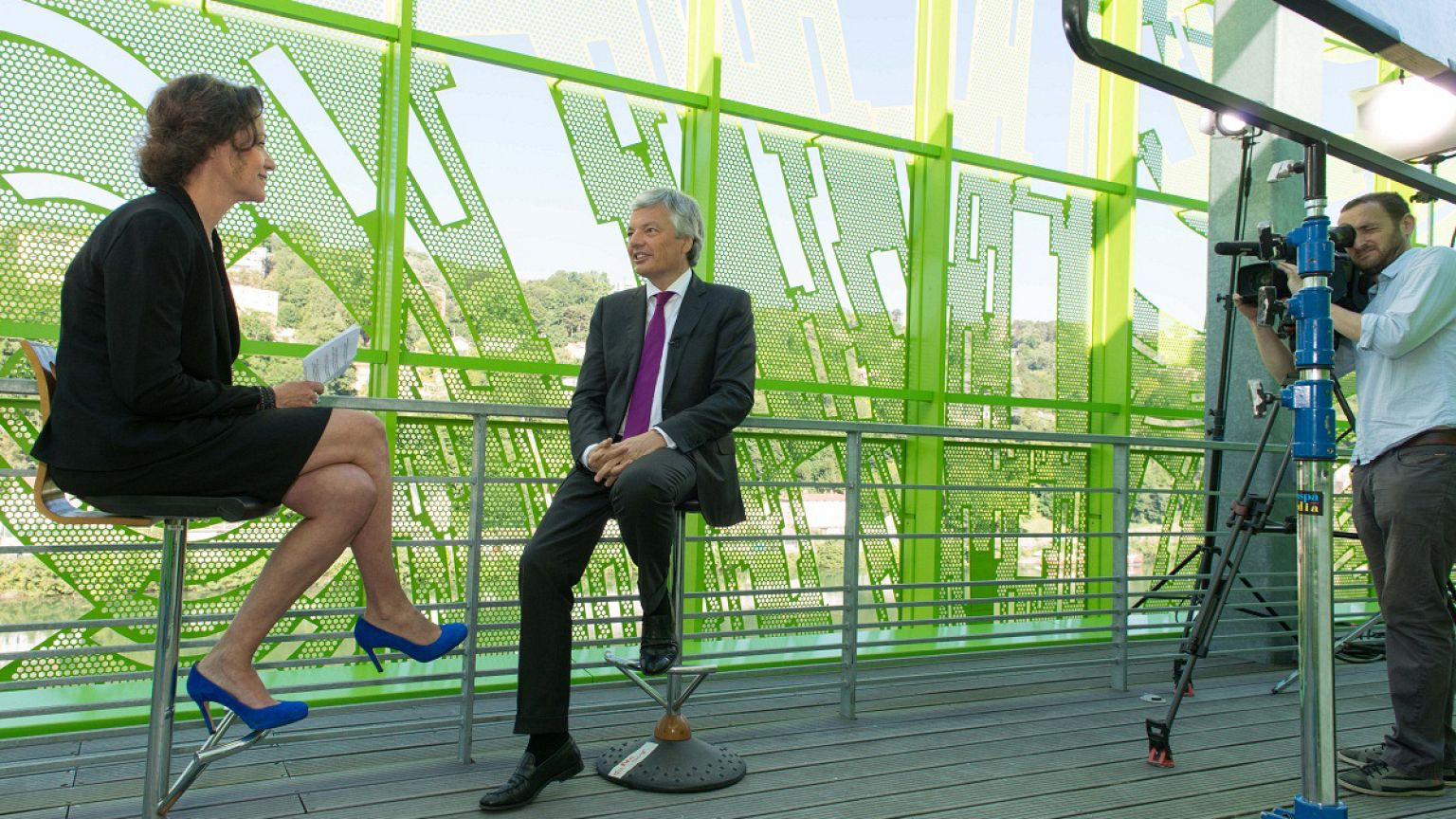Belgium’s top diplomat, Didier Reynders, a firm believer in the strengths of European integration, advocates for a Europe of peoples’ choices applied
 ADVERTISEMENT
ADVERTISEMENT
Belgium’s top diplomat, Didier Reynders, a firm believer in the strengths of European integration, advocates for a Europe of peoples’ choices applied by governments. At new euronews headquarters in Lyon, France, we talk about secret service cooperation, the euro and human trafficking in the Mediterranean.
Sophie Desjardin, euronews: “Didier Reynders, as a veteran of Belgian politics, notably you were finance minister in 1999 and piloted the transition to the euro… How do you see the single currency 15 years later? Was it worth the effort?”
Didier Reynders, Belgian Deputy Prime Minister and Foreign Minister: “Yes, it has truly reinforced Europe’s position on the international stage. Just one example: in industry, since we got the euro, Airbus has become a stronger competitor to Boeing, because contracts can be negotiated in euros, major exporting is done in euros. Clearly, that has made life easier for a huge number of companies. It is the money of young generations. It is probably one of the last European dreams to come true. Others will have to be found to offer people.”
euronews: “But between those who have never wanted it and those who threaten to leave it, how is this beautiful great basic idea holding up to the resistance?”
Reynders: “The euro is holding the road because we’ve reinforced the tools. The European Central Bank has a real control over the banks, and over the banking crisis. But we really see an evolution. In 1999, when I started as finance minister, we were 15 member states in the EU. But today we are 19 in the euro zone. If we had told you 15 years ago this was going to happen… No one believed it: this fast. And it will definitely grow more.”
euronews: “Do you envisage Greece leaving the euro?”
Reynders: “It is a possibility if the Greeks want to. Why not have a Europe of choices made by the people?”
euronews: “A while ago you said it would be highly damaging.”
Reynders: “I didn’t say it would be simple. I want Greece to stay in the union and the euro zone. I want Britain to stay in the European Union. But we can’t go against choices, if they are clear and definitive, made by the people of different countries. If it were to happen, we have the means to manage a crisis like that. Our reservation over the past few years is that such an exit would lead to reflections on Spain and Portugal and perhaps others.”
Reynders: “That’s the big fear. Today we’ve built up much stronger means to act with, but I repeat: I prefer that we find an agreement with Greece in the hours and days to come. It’s really quite straightforward. We can give Greece time. As far as I’m concerned, Greece can take a great deal of time to pay back its debt. We can very strongly reduce the interest rates because we always earn money on loans European states make to Greece, but Greece must commit to coming back to sound practice.”
euronews: “Movements such as Syriza in Greece and Podemos in Spain, who have rocked the Spanish political landscape, are signs of a rejection of some European policies. Are you taking them seriously?”
Reynders: “Yes, absolutely, because this evolution is happening in a lot of countries, so in those that have suffered a lot, notably in southern Europe, I can understand that these countries see political currents emerge who want something else. It’s not necessarily a rejection of Europe.”
euronews: “They have actually said they want a more social Europe, a different Europe.”
Reynders: “[Let’s have] a debate about a different Europe, then. I don’t necessarily share the ideas of these political formations, but I can understand that there is a real debate about what political directions to take. What I’d like people to understand is that it is first up to the government put in place to change the national policy. What I expect from the Greek government today is that it tell us, ‘here are the measures we will take’. When a party in Greece says, ‘what must be done is tax the rich’: do it. It’s the Greeks’ choice. I’m not saying I’m in favour of the programme of a political party now in power in Greece, but if it has options, let it put them to work.”
euronews: “Is a referendum on leaving the EU, that David Cameron has promised after his re-election, a poker move?”
Reynders: “It’s always dangerous, because when a consultation of the people is organised, a referendum, we never know exactly what the population is going to give a ruling about. That being so raises a real question, one that Europeans must also be willing to pose as well: what levels of jurisdiction must be organised in Europe? Is a given subject to be managed as local, city level, at national level, regional or European? Therefore, he has to accept that some jurisdictions are more and more European. I’m thinking about defence and security. But I am entirely in favour of the idea that some matters could return to national, regional or local levels a lot more.”
euronews: “Then what concession can be made for Cameron? What’s the red line?”
Reynders: “The red line is, essentially, not to go cherry-picking. It has to be a European decision. We have to keep to the community method.”
euronews: “Since the Charlie Hebdo attacks in France, Europe has been under the threat of terrorism. You have a front row seat in talks about anti-terrorist cooperation. Any progress?”
Reynders: “Immediate steps have been taken, firstly protective measures in our different countries. The second measure is the exchange of intelligence, to fight the most effectively, notably to keep track of foreign combatants.”
euronews: “Intelligence is not a key jurisdiction of the European Union…”
Reynders: “No, and the Belgian who is in charge of anti-terrorism cooperation, Gilles de Kerkove, often complains about the lack of intelligence service coordination.”
euronews: “So can we really be efficient?”
Reynders: “There’s progress. I’ll be visiting Interpol here in Lyon, because the exchange of information by police forces is notably done through Interpol, and that is effective. That’s the priority, everywhere in the world. I urge that information exchange be developed all the time. The data concerning airline passengers struck me, because we’re told it’s about protecting privacy, although the data are simple — names and nationality are what we’re asking for, and knowing where someone is going. And then there is some tragedy, such as the German Wings flight from Barcelona to Dusseldorf. In two minutes, someone contacts me as minister and I’ll tell you who was on board and if there are any Belgians. How can I if there is no data collection? So, when it’s about an accident, everyone finds it normal that we have a data base, but not for fighting against terrorism. It doesn’t make sense.”
euronews: “Talking about immigration: the tragedy at sea is increasingly affecting public opinion. Distributing asylum-seekers is nice IDEA, but is that all it is?”
Reynders: “We have to have stronger solidarity on asylum at the European level. We have to respect the right of asylum when people are persecuted in their countries. We have to take them in. As for economic migration, people who leave their country because misery forced them to, we first have to work together on this in the countries of origin, through development aid.”
“We’ve been saying that for years.”
Reynders: “It has been years, but perhaps we are not doing enough, and it’s important that we make our people understand that, in times of crisis, even if we don’t act from generosity, it’s in all our interests that people not want to leave their countries. And the traffickers must be fought. This is trafficking in human beings. We’re going to have to work against the whole chain, and be a bit more open. So, I don’t much like talking about quotas, but at least sharing the effort. Some of these people have to be taken in everywhere, and if we don’t know how or if these people don’t want to go to such-and-such a country, the costs can also be shared around, the financial costs of taking them in.”













